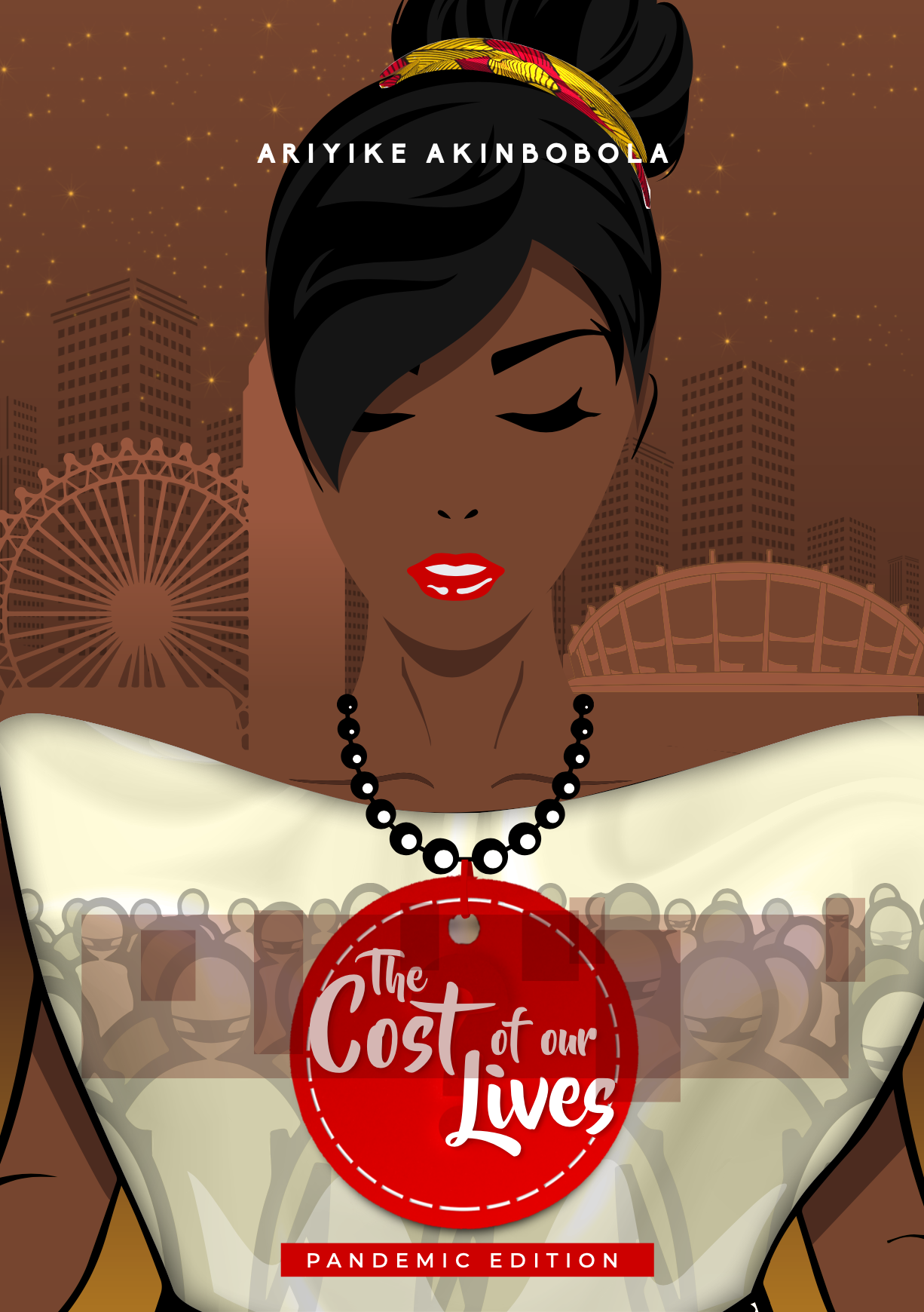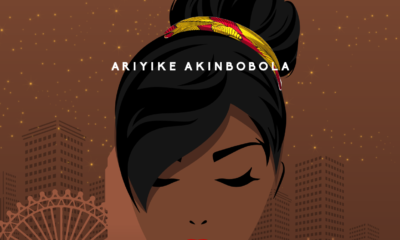Features
Ariyike Akinbobola: Welcome To London – Excerpt From “The Cost of Our Lives”

For the past few weeks, I have been serialising my book, ‘The Cost of Our Lives – Pandemic Edition‘, and sharing a chapter with you every week. The Cost Of Our Lives highlights the story of how Ibidun was taken from Ajegunle to London by her mother’s friend. This novella details Ibidun’s London adventure of friendship, betrayal, freedom, and how she was able to return to Nigeria to begin a career as a celebrity fashion stylist.
I hope you enjoy reading it as much as I enjoyed writing it. If you missed the previous chapters, read them here.
_
“Welcome to London, ma’am.”
I rubbed my eyes with my two hands, trying to get them London ready. The airhostess was smiling down at me as though she knew what I was thinking.
“Please, where is my aunty?” I asked as I looked at the airhostess and noticed how neatly dressed she was. Her uniform and hair were in place, and she looked as if they just tore her out of Vogue Magazine.
“I beg your pardon ma’am, who’s your aunty?”
I looked around me and realised I was the only passenger left on the plane. How come nobody even bothered to wake me up? “My Aunty Maria, the tall lady that sat in the front,” I said, pointing towards the direction I had come from some hours ago. She chuckled and looked at me as if I had woken up from a dream and was still trying to coordinate my thoughts before she spoke.
“Ma’am, you need to alight from the plane, when you get to passport control, I’m sure your aunty would be looking out for you.”
I looked around to see if my bag was in place. I got up, carried the bag Mama had bought for me from Balogun market and off I went.
As I walked around the airport, I wondered how people who could not read would cope in London as all instructions were clearly written, and you didn’t even need to ask anyone for directions. After I had wandered around the airport for a few minutes, I finally found Aunty Maria, or should I say she found me.
“Ibidun, I’ve been waiting here for over thirty minutes, where the heck have you been?” I was very relieved to see her and quickly apologised to her before she changed her mind about adopting me and sent me back to Ajegunle. I explained that I had fallen asleep on the plane and thankfully she only gave me a stern look and said, “Girl, this is London, you have to be smart.”
I hurriedly mumbled, “Yes ma” and listened when she spoke to her fellow Londoners as we moved along. They spoke too fast through their noses and I hardly even heard any word of what they said.
The next set of hours went by very quickly. In no time, we were out of Gatwick Airport and on our way to Aunty Maria’s. The cab driver must have been Aunty Maria’s regular customer because he knew his way to her house and didn’t ask before he stopped in front of the brown building. When we got out of the cab, Aunty told me that the area was called Hammersmith, and that a lot of rich people lived there. The front door was opened by a short, stout man who must have been in his late forties. He was as black as charcoal and his pot belly could conveniently sit two glasses of water. He welcomed us in with a strong Benin accent.
“Ibidun, this is my husband, your new dad, so feel free to call him daddy,” Aunty Maria said when we got in.
My ‘new dad’ looked at me from the crown of my head to the sole of my feet and then I noticed he licked his lips. This one definitely had wandering eyes and I knew I had to get ready for him. “Hello sir,” I greeted him.
With a smile on his face, he said, “Please don’t call me sir, you can call me Osa or Daddy.”
I almost giggled out loud. He had to be kidding. Did Aunty Maria and her husband think it would be so easy for me to just start calling him daddy? Just like that? I quietly murmured, “Ok Uncle Osa.”
A few days after I arrived, Aunty Maria took me out to different parts of London and showed me the bus and train routes she took to work. She owned a cleaning outfit that outsourced cleaners to clean offices and hotels in Central London. The first time I went out on my own, I kept staring and gazing at the double-decker buses, marvelling at the sights and scenery of what they called ‘the swinging city’. Soon Aunty Maria began to wake me up at 5a.m every day to head out to the different locations where the cleaners were working, but as the days went by Aunty soon became too tired to wake up early so I was the only one going out to supervise the cleaners. The cleaners soon began to complain that Aunty hadn’t paid their salaries for weeks so they began to resign one after the other. Before I knew it, I was working four cleaning shifts in different locations on a daily basis.
The most challenging period was when I had to leave home so early during winter. My hands and legs would practically freeze as I waited at the tube station for the train. Aunty had already shown me how to move around and I always had a copy of the London underground tube map with me just in case I missed my way. When I got back home in the evening, I would still have to do the dishes and clean the house before going to sleep on the mat just outside the kitchen. That was the coldest part of the house because the heating system didn’t get there. Sometimes, I would wake up in the middle of the night to sleep in the bathroom because it was quite warm in there. More than three years after I arrived at Aunty Maria’s, she still had not sent me to school as she had promised Mama. Instead, I was working for her and earning nothing. Was this her plan for me? I wondered if she already had it all planned out when she came to the orphanage back in Nigeria to ask to adopt a child. So if she had succeeded in adopting one of the teenagers at the orphanage, was this how she would have treated the child? She clearly wasn’t looking for a child but a slave. This woman was evil and I knew I had to leave; I just didn’t have any backup plan. I was already an adult, yet I had no friends in London. The only other person I had met was Zainab, the manager of one of the hotels I cleaned. She must have been about 25 years old. She was very reserved and uninterested in anything other than work. I couldn’t go back to Nigeria because my six months visiting visa had expired long before then and my passport was with Aunty Maria. She had said she would need it to process my admission into school. I wondered how Mama would feel if she heard all that had happened to me. The few times Aunty Maria allowed me to speak to Mama over the phone, she would stand next to me to hear all I was saying to my mother, just to be sure I wasn’t reporting her. I knew I had to move fast so I made up my mind to speak to Zainab the next day. She had to be my only solution.
When I greeted Zainab the next morning at work and tried to start a conversation with her, she squeezed her nose and looked at me as though she wasn’t meant to be talking to me. I ignored her and began to pour out my frustration. I didn’t know when it started raining tears from my eyes as I poured out my heart to Zainab. By the time I was done, she was clearly overwhelmed that anyone would be so mean and so she offered to help me. She even suggested that I didn’t have to go back to Aunty Maria’s house and that I could go home with her after work. I had nothing to lose, especially as I had practically nothing in Aunty Maria’s house except my passport.
Zainab gave me her address in Kilburn and the tube route to get there because we had planned to leave work at different times. She said it was safer not to be seen on the CCTV cameras leaving work together, just in case Aunty Maria planned to come looking for me. I left the hotel at 6p.m and proceeded to the bus stop. The only money I had on me were the coins I had taken from the hotel rooms I had cleaned, I was 6 pounds rich, that was all I had. Luckily for me, I had my monthly travel card, which Aunty Maria provided, as my means of transportation. Off I went to Zainab’s apartment. She had already told me to get the key from inside the flowerpot just by the door. It reminded me of how we hid our spare key under a big stone beside our window, back home in Ajegunle, even though we rarely used it. Zainab’s place was a studio apartment that could barely accommodate two people. It was like a cubicle but I was grateful that she had even agreed to take me in. She got home about thirty minutes after me. We had a little chat about my situation and she promised not to disclose my whereabouts to Aunty Maria if she was ever asked at work. I was finally free.
I tried my hands on several odd jobs while I lived with Zainab. She had taught me to say my passport was with the home office if I was asked by potential employers. I worked at a cold room in Shoreditch for two months before moving on to work at Kudd’s Undertakers in Stanmore where I was in charge of cleaning and dressing up dead bodies for small funeral services. The money was good but I hated the job. It made me have nightmares about dead people and all kinds of things. I desperately wanted to resign, but I had to find a new job first. One day, while reading theEvening Standard on my way home from work, I stumbled on a vacancy advertisement and decided to apply. Zainab had helped me write out my resume in a more presentable way. I did some editing and sent in my application.
After a few days, I got a call for an interview at Primark on Oxford Street. I got there looking sharp in my black skirt suit and white shirt. I was directed to the waiting area where I waited for a while until a gentleman walked up to me.
“Good morning Miss Zainab, please come with me,” his British accent was thick. It took a few seconds before I realised he was actually talking to me. I got up and walked right behind him. I had applied for the job in Zainab’s name, using her details and documents. Zainab would never know as long as I could ensure she never paid me a visit at work. I got the job and was told to start the following week. By the time I resumed at Primark, I had saved enough money from my previous job to get my own place in Peckham so I moved out of Zainab’s house. It was extremely emotional for the both of us. I remember that day like it was yesterday. We stood outside her apartment, hugged and then we both started crying at the same time. Zainab was extremely kind to me and I could never forget her, however, it was time to forge ahead, time to move on to better things, time to build my fashion career at Primark. That was how I started working at Primark on Oxford street.
_
Join me next week for the next chapter of The Cost Of Our Lives.



















